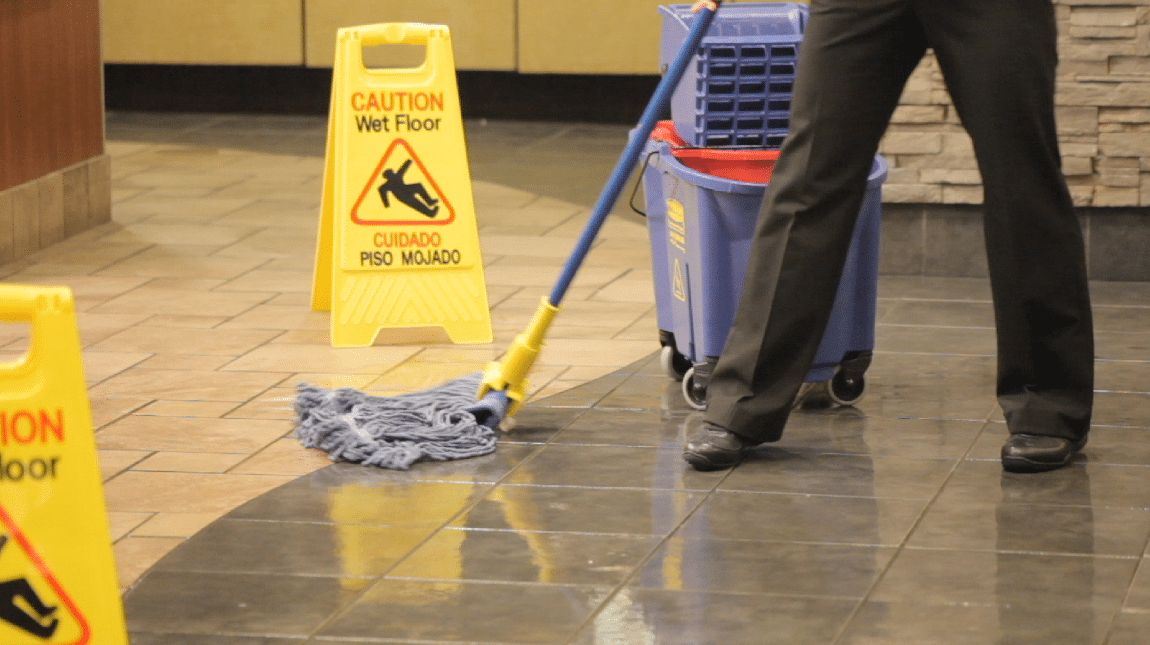Floor Cleaners
It’s a messy game we’re in. Accidents happen, milk gets spilt. It’s not worth crying over.
Unlike the global mass extinction of bees.
But I digress.
We can’t do much about the bees, we can however clean whatever comes across our floors.
Just as you know that you don’t clean your hair with toothpaste, so too is it important to use the right chemical for the right task when cleaning your venue. Today we are talking about flooring and doing our best not making it boring.
Before we get into it, a quick recap on a couple of key words.
Chemistry Time
Ammonia – Ammonia is a base, like lye (sodium hydroxide). Like lye, it can react with oils and fats to form soaps. As a cleaner, ammonia turns fats and oils on glass or tile surfaces into soap, and the water in the ammonia solution dissolves the soaps so a sponge or paper towel can carry them away. What is left is a solution of ammonium hydroxide which then completely evaporates, leaving no streaks on the surface.
Caustic – Sodium hydroxide is frequently used as a cleaning agent known as caustic. It is a highly basic substance that dissolves proteins at ambient temperatures. This means it can dissolve grease, fats, oils and protein based deposits. This also means that it can be quite hazardous.
Solvent – Water is a polar molecule. Generally speaking, polar molecules will only dissolve other polar molecules. Most oils found in kitchens (animal fats, vegetable oils, cooking oils, etc) are non polar. This means that it will not dissolve in water alone. This characteristic is what makes grease stubborn to clean, and can make it very slippery and hazardous to the touch.
Degreasers have two ends, a hydrophobic end (water hating) and a hydrophyllic end (water loving). This allows one end to bind to the oil molecule, and the other end to join to a water molecule. This facilitates the removal of grease from whatever surface it is on; in this case floors.
This mechanism of action is known as solvent cleaning, as it makes a previously insoluble substance (oil, grease, fat) water soluble.
Why Do I Care?
These terms are important in regards to floor cleaners, as these different chemical properties and actions are what set apart the various products on offer.
Different products suit different needs based on these differing actions.
Generally speaking most venues can split their floor cleaners into front and back of house.
Front of House:
Surfaces can range from tiles to treated wood to almost anything. Generally, what will need to be cleaned is a combination of dirt walked in, spilt drinks and food scraps. What is needed is a good all purpose cleaner, one that is safe for most surfaces and is capable of breaking down grease.
What to use:
Floor Cleaner – A good, all purpose floor cleaner with ammonia for quick drying. It contains less active ingredients than the products listed below, but will still prove effective at cutting through most front of house mess.
Back Of House:
Will either be tiled or grouted. Generally these floors see a lot more grease spillage than front of house, and as such they need a lot more chemical power to clean.
What to use:
Multi Purpose Degreaser – Containing about 5% caustic, this degreaser is aggressive on grease and kitchen floors. It provides a cost effective option for cleaning the messiest of kitchen flooring situations.
If you aren’t a fan of using caustic cleaners due to environmental or health concerns we also recommend:
Heavy Duty Degreaser – It contains no caustic ingredients, so it is safe on aluminium/brass and softer metals, as well as safer for people. It does cost more than the Multi-Purpose Degreaser, but it is great for boats, caravans and other environmental sites that need degreasing.
As Albert Einstein once said, “If you judge a fish by its ability to climb trees, it will spend its whole life believing its stupid.”
Pick the right chemical for the right job, get the right results. Don’t throw fish up trees.
If you want to speak to someone about improving your floor cleaning regime, contact your rep or call us on (02) 9052 9111.
P.S. We also sell mops, buckets and wet floor signs too. Just saying.

